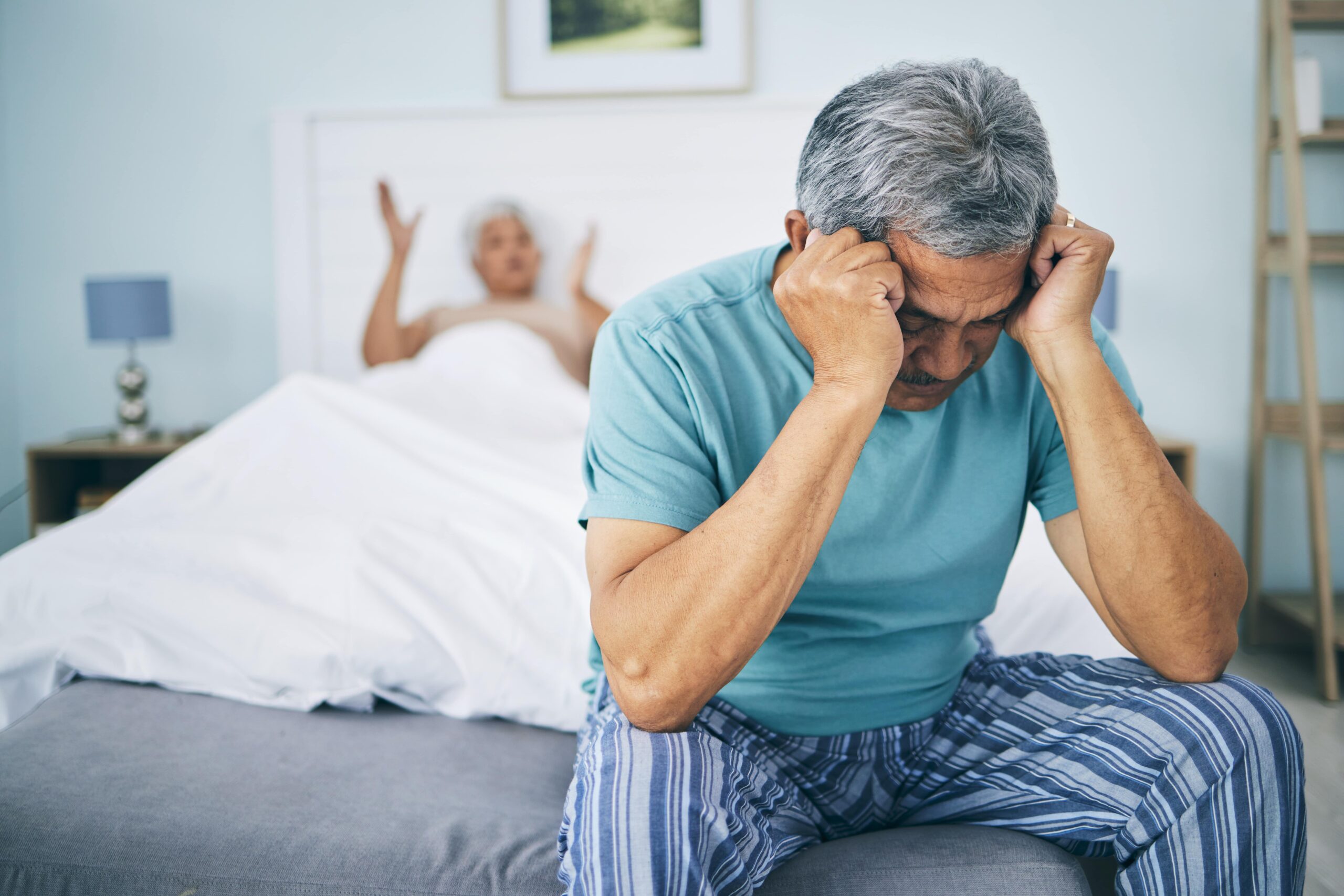
You feel desire. You want connection. But your male sexual performance doesn’t always respond like it used to.
You pause.
You try to ignore it. Or blame it on stress. Or maybe wine.
Then it happens again.
And again.
Now you’re wondering if it’s aging.
You’re not alone. According to Harvard Health, changes in sexual function are expected as men age—but that doesn’t mean they’re irreversible.
And as the National Institute on Aging confirms, many men over 60 enjoy satisfying sex lives well into their 70s and beyond—when they take the time to understand what’s changing and how to adapt.
This blog isn’t about decline.
It’s about adaptation.
About resilience.
About reclaiming your body, confidence, and connection.
At Precision Sexual Health Clinic for Men, we work with men across Toronto who aren’t ready to give up on intimacy. And they shouldn’t have to.
Senior Men’s Health: What Changes After 60?

Aging isn’t a curse. But it is a shift. Here’s what typically changes:
Hormones: The Silent Influence
After age 30, testosterone levels drop by about 1% per year. By 60, that can lead to:
- Lower libido
- Reduced energy
- Mood changes
- Increased fat and decreased muscle
At Precision, we regularly test hormone levels and offer medically supervised testosterone replacement when needed. Learn more about our hormone therapy.
Blood Flow & Circulation
Erections rely on healthy blood vessels. But with age, many men experience:
- Slower circulation
- Increased risk of atherosclerosis
- Erectile changes or delayed arousal
A simple cardiovascular assessment can often identify if circulation is playing a role. Lifestyle interventions and targeted medications often improve results.
Medication Interference
Blood pressure meds. Antidepressants. Diabetes treatments. These are lifesavers—but many have sexual side effects.
We work with your medical team to explore alternatives, reduce interactions, and protect performance.
As this NIH resource notes, many common medications can impact sexual function—but awareness and proactive care make all the difference.
Muscle Strength & Pelvic Floor Function
You hear about Kegels for women—but pelvic floor strength matters for men too. Weak muscles = weak erections and poor control.
We help men retrain and strengthen those often-ignored muscles through guided exercises and neuromodulator therapy.
Sexual Vitality After 60: Is It Still Possible?
Yes. In fact, it can be more meaningful.
Redefining Performance
Your 60s aren’t your 30s. And that’s okay. Less urgency. More presence. Fewer distractions.
Many men find that sex after 60 is:
- Emotionally deeper
- Less pressure-driven
- More exploratory
Key practices that help:
- Open communication with partners
- Slow, mindful intimacy
- Touch beyond intercourse
Exploring Medical Options
Men over 60 may benefit from ED medications, testosterone therapy, or advanced treatments like shockwave therapy or PRP. At Precision, we tailor each plan to the individual.
Explore our full treatment suite here.
Partner Communication and Confidence
Sexuality thrives in connection. And confidence grows through clarity.
If you’re struggling, say it. If you’re confused, ask. If something’s not working, let’s fix it.
That’s what we do here. No judgment. Just strategy, science, and support.
Understanding the Aging Effects on Male Sexual Performance
As men age, five major systems start to shift:
1. Hormonal Balance
Lower testosterone doesn’t just affect libido. It impacts:
- Mental clarity
- Bone density
- Muscle maintenance
- Mood
Our approach at Precision includes full hormone panels, lifestyle assessment, and customized therapy.
2. Circulatory Health
Blood flow is vital for strong erections. Key indicators we look at:
- Blood pressure
- Cholesterol
- Inflammatory markers
We frequently recommend fitness improvements, dietary shifts, and sometimes low-dose ED meds to aid flow.
3. Psychological Factors
Mental blocks matter. So does trauma. Or performance anxiety. Or fear that something is “off.”
Therapies we offer:
- Sex therapy sessions
- Cognitive reframing
- Medication review
4. Medication Impact
As per research, even life-saving medications can impact libido or function. We help you navigate safer alternatives.
5. Lifestyle and Sleep
Fatigue kills desire. Alcohol disrupts hormone regulation. Poor sleep ruins recovery.
We support you through:
- Nutritional coaching
- Sleep optimization
- Moderate exercise planning
Want to dive deeper? Read our guide on how testosterone and sleep are linked.
Aging Effects and Sexual Function: What to Watch For
The earlier you notice changes, the faster we can help.
Common Symptoms After 60
- Erections that are slower or softer
- Less intense orgasms
- Longer recovery time
- Decline in morning erections
- Emotional distancing during intimacy
When to Seek Help:
- You’ve noticed a consistent pattern for 6+ weeks
- You’re avoiding intimacy due to fear or shame
- Your partner is feeling confused or hurt
Treatments That Work (Even at 60+)
Here are five that we often recommend:
- Testosterone Optimization – monitored, safe, and effective for low-T cases
- Shockwave Therapy – improves blood flow naturally
- Pelvic Floor Retraining – targeted strengthening
- Stress Reduction – mindfulness, therapy, and relaxation techniques
- Lifestyle Coaching – diet, fitness, and hormone-friendly routines
Want results? Book a consultation today.
As men move through their 60s, what changes most isn’t desire—but how the body responds to it. Slower erections, less intensity, and longer recovery times aren’t necessarily signs of dysfunction; they’re signs of aging systems adjusting. The good news? These changes are not final. From hormonal optimization and circulatory support to mental health care and pelvic muscle retraining, there are proven ways to restore confidence and connection.
At Precision Sexual Health Clinic for Men, we don’t treat age as an obstacle—we see it as a stage that calls for smarter, more personalized care. Whether you’re navigating new challenges or looking to reignite old sparks, there are tools and therapies that work. And many men in their 60s discover not just performance—but presence.
The truth is: sex after 60 isn’t over—it’s evolving. And with the right support, it can become even more fulfilling.
Key Takeaways
- Age-Related Changes in Sexual Health Are Normal—But Not Permanent
Most men over 60 experience shifts in libido, erection strength, and recovery time. These aren’t signs of failure—they’re part of the natural aging process. The good news? These changes are often reversible with proper care. - Testosterone Decline Impacts More Than Just Desire
Lower testosterone can affect mood, energy, and physical performance. If you’re feeling off and not sure why, your hormones may be the root cause. Learn more about testosterone therapy and how we support men in reclaiming vitality safely. - Circulation, Medication, and Muscle Tone All Play a Role
Your erection is a reflection of your overall health—from blood flow to pelvic strength. Medications and muscle loss can create silent barriers. Restoring sexual health often requires taking a holistic approach to healing. - Communication and Confidence Go Hand in Hand
Many men in their 60s enjoy more meaningful, emotionally connected intimacy—once they feel supported and understood. With the right tools and a clear plan, you can feel in control again. - You Don’t Need to Struggle in Silence
Whether you’ve just noticed a few changes or have been worried for a while, help is available—and it’s discreet, respectful, and tailored to you. Book a private consultation today and take the first step toward feeling like yourself again.
💬 5 Questions Men Ask About Aging and Sexual Health
1. Is it normal for men over 60 to experience erectile changes?
Yes—and it’s far more common than most men realize.
After 60, several biological systems that affect erections start to change:
- Testosterone declines, which affects desire and mood.
- Circulation may slow due to heart health or vascular aging.
- Pelvic muscles can weaken, making erections harder to maintain.
But here’s the thing: normal doesn’t mean nothing can be done.
What helps:
- Medical treatments tailored to senior men
- Testosterone therapy (when appropriate)
- Pelvic floor strengthening
- Lifestyle adjustments like diet, sleep, and exercise
💡 Tip: If you’re still getting morning erections occasionally, that’s a great sign your physical systems still work—and the issue may be treatable.
2. Can older men still have a healthy and satisfying sex life?
Absolutely.
In fact, many men report more emotional connection, less performance pressure, and greater satisfaction in their 60s than they did in their 30s.
It comes down to adapting to change and:
- Communicating openly with your partner
- Focusing on connection, not just performance
- Exploring new ways to be intimate
- Seeking support when needed
At our Toronto men’s clinic, we guide patients through customized treatment plans that align with their current lifestyle and goals. Whether it’s addressing ED, improving desire, or reducing performance anxiety, a satisfying sex life is still within reach.
3. What are the top aging effects that impact sexual vitality
As men age, the biggest changes affecting sexual performance include:
- Hormonal shifts: Lower testosterone impacts libido, mood, and energy.
- Circulatory issues: Less blood flow = weaker erections.
- Mental health: Anxiety and depression can increase with life transitions.
- Medications: Many drugs for high blood pressure, diabetes, or depression have sexual side effects.
- Muscle tone: Pelvic muscles play a bigger role than most men realize.
🧠 The connection between brain, body, and performance becomes even more important as we age.
🧬 Many of these issues are reversible or manageable with the right care. We often recommend a comprehensive assessment that includes:
- Hormone testing
- Mental health screening
- Cardiovascular evaluation
- Medication review
4. Should I consider testosterone therapy if I’m over 60?
Testosterone therapy can be life-changing—but it’s not a one-size-fits-all solution.
We first ask:
- Are you experiencing low libido, fatigue, or mood swings?
- Are your levels clinically low?
- Do you have other health conditions that could be contributing?
If yes, testosterone therapy may:
- Improve sexual function
- Increase energy and drive
- Enhance muscle mass and bone health
- Improve sleep and cognitive clarity
But it must be prescribed with monitoring and balance. Overdoing it can cause issues like mood swings, acne, or even prostate changes.
5. When should I talk to a doctor about senior men’s health concerns?
Don’t wait until things feel “serious.”
You should speak with a men’s health doctor if:
- Erections have become consistently weaker or less frequent
- You’ve lost morning erections for several weeks
- Desire has dropped dramatically with no explanation
- You feel anxious or ashamed about performance
- You’ve started new medications and noticed changes
Getting help early prevents:
- Relationship strain
- Performance anxiety spirals
- Unnecessary suffering
Our Toronto clinic specializes in confidential, judgment-free support for men 40, 50, 60+ who want to feel like themselves again.
👉 Book a discreet consultation or walk in to speak with a specialist.